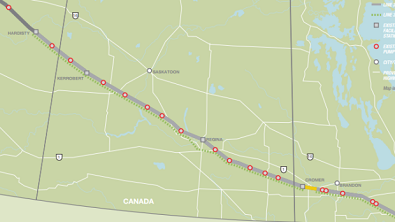A map of Enbridge’s Line 3 Replacement Pipeline Project. Courtesy enbridge.com
The Federation of Sovereign Indigenous Nations says the protection of land and water and consultation with First Nations must be top priority during construction of a new pipeline through Saskatchewan.
On Tuesday, the federal government approved Enbridge’s Line 3 Replacement Program that will travel through southern Saskatchewan. The pipeline tuns from Alberta to Wisconsin. The government also approved the Kinder Morgan pipeline while rejecting the Northern Gateway Pipeline.
The pipeline runs through Treaty Six and Treaty Four territories and passes by several First Nations.
“As projects like L3RP go forward it is crucial that stringent protections for the environment be put in place to protect our communities and that our First Nations concerns and recommendations are abided by based on our Inherent and Treaty Rights to lands and resources,” says FSIN Chief Bobby Cameron. “It is the best interest of us all to learn from the Standing Rock experience and find solutions through consultation and accommodation.”
Chief Cameron says he is neither for nor against the pipeline, but says these affected First Nation communities need to be consulted during the construction process. He believes they were not consulted enough during the approval process.
“They must absolutely get in touch with our First Nations and work with them and hear and respect what they are saying and recommending,” says the FSIN Chief. “There has to be 100 per cent inclusion from beginning to end and we will maintain that same path for as long as the sun shines, the grass grows and the rivers flow.”
When asked if Indigenous responsibility to protect land and water can live in harmony with pipeline construction, Chief Cameron channelled Prime Minister Justin Trudeau by saying “better is always possible.”
“Can we get there? I think so,” says Cameron. “But we have to be aware of certain decisions that are being made and if they don’t provide a positive impact for our First Nations people will become frustrated.”
Thirteen Indigenous groups from Saskatchewan participated in the National Energy Board process in 2015. While the First Nation groups didn’t show the same kind of opposition to the Line 3 Pipeline as they did against the Northern Gateway Pipeline, they did express concern about the environmental protection on their traditional lands.
The NEB report also included 89 conditions that Enbridge must “meet and exceed.” The FSIN points out that one condition says that Enbridge must develop a plan for First Nations to participate in monitoring the construction if the project.
“In order for Enbridge to exceed the NEB conditions… it must also develop a process to ensure that First Nations monitoring goes beyond the construction phase and includes an on-going operational monitoring process for the life of the pipeline,” says FSIN Vice-Chief Dutch Lerat in a statement. Vice-Chief Lerat is responsible for the lands and resources portfolio.
The FSIN is also proposing to the federal government the creation of a First Nations Monitoring Office, which would provide technical capacity to First Nations in both the assessment and implementation stages of natural resource development projects.
According to Chief Cameron they will be meeting with Enbridge officials on Friday to discuss the pipeline.
